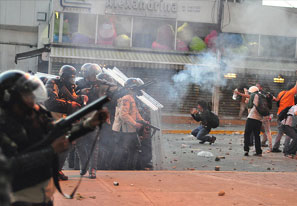
As someone who once worked in Venezuela and keeps in touch with friends there, I watch that country’s continued violence and unrest with a heavy heart. Six weeks after President Nicolás Maduro’s government began its violent crackdown on protesters, a peaceful resolution seems out of reach. As one Caracas resident told the New York Times, “I think both sides are looking for it to explode.”
I traveled to Caracas twice in the early 2000s as part of a Manhattan Institute initiative to share ideas with Latin American mayors. My colleagues and I worked with the Venezuelan think tank CEDICE to organize a “municipal innovation” conference that brought experts on education and public safety from the United States to speak with their counterparts in Caracas, including Mayor Alfredo Peña and Police Commissioner Ivan Simonovis. The Manhattan Institute arranged for former (and current) NYPD commissioner William Bratton and his aides to work with the Caracas Metropolitan Police to improve public safety in the Venezuelan capital, which suffers from a terrible crime problem. We achieved promising results before then-president Hugo Chávez began undermining and politicizing the project.
By the time the of the April 2002 coup that briefly forced Chávez from office, it was clear the project was over. (For a biased but fascinating behind-the-scenes look at the disastrous 2002 coup, check out the documentary The Revolution Will Not Be Televised.) Peña was driven from office and fled to Miami. Simonovis was arrested in November 2004 on dubious charges; he remains in a Caracas jail to this day.
At the time, we also worked with Leopoldo López, the leader of the Voluntad Popular opposition party who was jailed last month by Maduro on trumped-up charges of instigating arson, damage, and criminal gatherings. Back when we worked with him, López was a young, reform-minded mayor of Chacao, one of the five administrative subdivisions of the Caracas Metropolitan District. He had sought our help in creating better schools for the children in the one poor section of his otherwise wealthy district. Carlos Medina, a former superintendent of schools in East Harlem and a senior fellow at the Center for Educational Innovation (CEI), took López on a tour of some of the remarkably successful public schools that the CEI had helped to create in New York. I remember López asking insightful questions about pedagogy and the characteristics of successful schools.
About a year later, López took us on a tour of a glistening, brand new, five-story school he had built at the foot of a mountain in the heart of the poor section of Chacao. Named for a well-respected Venezuelan educator, Juan de Dios Guanche, the school was the neighborhood’s crown jewel and boasted a unique feature—the playground was on the roof (high walls and a net kept any children or soccer balls from going over the side). López he told me that he did it “to get the kids away from the stress of the streets, to put them close to the mountains and sky, to give them a sense of freedom.”
For a man hoping to offer peace and freedom to children, López has received precious little of either over the past decade. There have been several attempts to assassinate him, including one attack in which his bodyguard died in his arms. A few years ago, Chávez charged that López was corrupt and blacklisted him from running for elective office. And now he sits in a Caracas prison.
It’s true that López comes from a wealthy, well-connected family. It’s also true that in Venezuela, as in much of Latin America, the poor have been marginalized for decades while oligarchs grabbed much of the nation’s wealth. But judging from my interactions with López, he seemed capable of helping to heal Venezuela’s socioeconomic divide. His concern for the poor and his interest in creating a more equitable society struck me as genuine. He was immensely popular among all socioeconomic groups in Chacao. Elected with just 51 percent of the vote in 2000, he garnered 81 percent in his 2004 reelection. A Chacao woman once pulled me into her modest home in the barrio to show me a poster of López which hung on her wall (his movie-star good looks may have had something to do with that).
I don’t presume to be any kind of expert on Venezuela, and I don’t pretend to have the answers to the nation’s troubles. From afar, it seems that the opposition should focus on preparing for the 2015 parliamentary and 2018 presidential elections, while imploring international organizations such as the Organization of American States and the United Nations to demand the release of Leopoldo López and all other political prisoners. But I don’t have to live with hyperinflation, growing shortages of food and medicine, and an astonishing murder rate. If New York City’s murder rate was as high as Venezuela’s, it would translate to more than 10,000 murders a year in the Big Apple (in fact, last year there were just 335).
Writing in the New Republic, the eminent Mexican historian Enrique Krauze held out hope for “a rebirth of political liberties in Caracas.” This rebirth, he maintained, “would reverberate in Cuba. . . . And, then, perhaps for the first time in 200 years of independence, we would have an entirely democratic continent, with right-leaning and left-leaning governments but free from our endemic plague of authoritarian caudillos, who have so often confused the history of a country with their own desires.”
I hope Krauze is right, but achieving this vision will take time and effort. Venezuelan society has been badly torn apart. Putting it back together will not be easy.